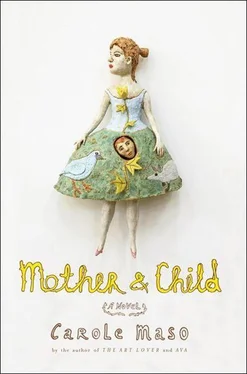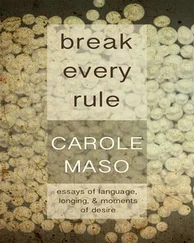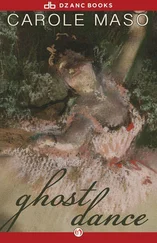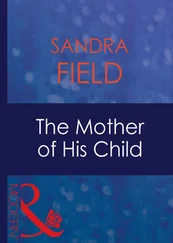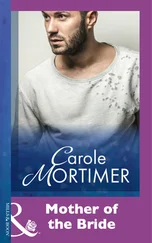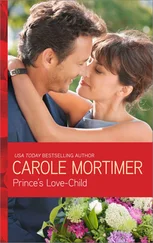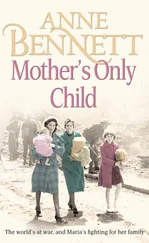Come let us dance, for time is short! The mother sang, and the child played the bone piano and the family danced like dervishes, and the house stood in all its glory, securely on the far side of the char.
When it was late and the family of Cecil Peter was sated and the child’s shoes showed wear from all the dancing, they wrapped what remained of the cake in shining silver foil, and the child put a fancy red ribbon on top to signify the fire, and the consensus was it looked like a space capsule, and they lifted it into the mother’s yellow wagon. It rivaled the moon in its brightness, and as it traveled down the hill, the moon did call to it, and the family of Cecil Peter and Wise Jean, including all their children and grandchildren and nieces and nephews and other relations, began their glinty way back down the hill.
What a night, the mother thought, and while they made their way home, she thought of Cecil Peter who fell from an apple tree as a child and hurt his arm; Cecil Peter who had been Apple Tree Cecil, then Falling Cecil, then Cecil of the Gangrene. Like a saint the mother shuddered; now he was Cecil the One-Armed Handy Man, filled with cake, and celebrated for saving the house from cinders again.

FOR YEARS THE Queen stood in the darkest part of the garden. Over time she grew more and more weak as she reached for the sun. She had been a regal rose once — tight, beautifully shaped, upright, tall — and when the old cherry tree that shaded her finally fell down and light flooded in again, her natural beauty once more began to flourish.
The mother had always watched the Queen but had never given in to her many demands. She had observed her struggle with a kind of detachment, noting: tall, gangly, remote, prone to thrips. As the child followed her mother on her rounds, she could not help but notice that every other rose in the garden was lavished with attention: water, light, food, deer repellent, insecticidal soap, compost — but not the Queen.
The rose is the most precious of all flowers, the mother said, for out from its stem of thorns blossoms the sacred heart where the red cross of Mary’s son is forming.
The mother remembered now the men who carried heavily thorned roses into battle, where they perished.
But what about the Queen? the child asked. Where is her food? Where is her compost? Why do you pay attention to everything but her? Even the Monkshood you have doted on, the child says. Why the Monkshood?
Because it is a living thing, it must be revered as such.
Yes, but what about the Queen then?
To tell you the truth, the mother says, I am a little ambivalent about the Queen. I have some ambivalence.
What’s ambivalence?
It means you’re not sure, the mother says.
Maybe that’s why the bat came, the child said. Your ambivalence about the Queen.
The mother looked at her curiously.
How can you not be sure about a rose?
YOU GAVE ME too much medicine tonight, the child says.
No, I did not.
You did, you already gave me two teaspoons and now you have given me two teaspoons more. Before I know it, you will be forgetting the two plus two and giving me two teaspoons more. You must hear the ambulance going by. You must see the men in white coming now to the door. They are here to rescue me.
No.
You must have some ambivalence, the child said.
I SAW A bobcat in the grass. Or a mountain lion — some big cat, the mother sang. And a giant Blue Heron!
You did not, the child said. Without me? Not without me!
I did.
Remember the lake, and the Venetian explorer?
I do.
And the beautiful blue tether made of silk?
I do.
WHEN THE MOTHER gets dizzy and has to go upstairs for a minute to lie down, what is left is this: on one side of the kitchen door is the child alone finishing her papier-mâché vase, and on the other side of the door is the head of a squirrel on the welcome mat, the only part of the squirrel’s poor anatomy Bunny Boy has left behind. There was a ferocity in ordinary things and suffering around every bend. The mother closed her eyes and saw its gray head blooming, crimson roses streaming from the neck.
The whirling mother upstairs recalls the green rain of frogs last spring. At night the night creatures had come and eaten off their legs, leaving their torsos for the mother to find the next morning, their hearts still beating.
But today while the mother is dizzy, the child does not know about the squirrel just feet away on the other side of the door, or the rain of frogs, or the real reason for the mother’s vertigo — her beautiful vase is ready — and when she sees the mother descend the stairs restored, anything in the world can be weathered.
THE VIRGIN APPEARS to the mother and gestures for her to come into the forest, a place the mother loves to see the Lenten Rose.
The mother shakes her head no. I’m not ready yet.
The Virgin smiles and around her a little fawn prances.
Above all, the mother wanted more time. She sat at the edge of the dark wood and wept.
EVERYONE IN THE Valley knew that the man drank, and that sometimes his eldest daughter would come by to check on him, but lately she came less and less. During moments of enthusiasm, the man had kept a vegetable garden, but the garden now had gone to gloom, and if you did not know there had been one, it would have been better, because then it would just seem like another sad patch of land and not a garden that had been taken back while the man sat inside. It was particularly sad to think of that: the time when the man still had enthusiasms. The child felt that she understood something about the man who lived in the closed house and could never come out. The child heard that he liked to drink, and she left bottles of water by his door in case he got thirsty.
People in the Valley sometimes talked about him, but it was usually in the past tense, as if he were already dead. The man had been a baby in that house, and he had not begun drinking yet, and he was not already dead. Someone had cared for that baby. The Valley must have been even more beautiful then — so expansive, so wide, so pure, so many places to roam. Someone lifted the baby toward the impossibly blue sky. He had been taken out for fresh air and sunshine and walks. Once someone had taken a photograph. It showed a woman pushing a black perambulator, and inside it, protected from the sun, was the man.
A THREE-RING CIRCUS of sorts had made its way to the Spiegelpalais, and the child watched as it slowly assembled. Hildy the German Juggle Boy, Tavis the Silent Clown, and Rosalie’s Racing Pigs — they were all there. Even the Dock Diving Dogs featuring Hanson’s Hounds. In one corner a Mad Science Millennial Chess Match had been set up, and the child, who excelled at chess, sat down. And in the rafters above their heads, already caught in the kleig lights, the Flying Child.
THE CHILDREN FROM the city had come for the day, and the neighbors invited the mother and child over as well. The mother and child brought them a bouquet of roses from the cutting garden.
The children from the city had roller blades and wheelies and cell phones and did the newest dances, and they taught the child all the moves. They also talked about skyscrapers and anything else the child wanted to talk about. The child liked the oldest boy most, and his rollerblading, break dancing, and skyscraping stories. The day was hot and the children swam and played, and they liked each other very much. In the garden, the children from the city were astonished by all the heart-shaped leaves there were to find. When it was late in the day the children went into the barn, but the mother forbade the child to go up to the barn’s loft with the oldest boy and his sisters.
Читать дальше
